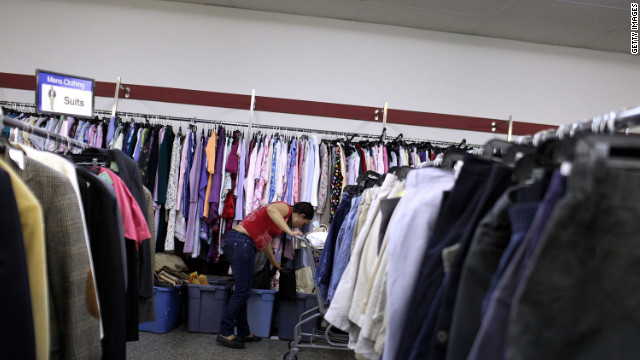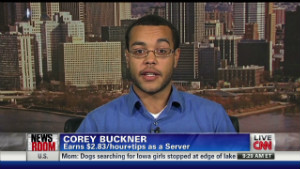On September 17, 2011, over one thousand protesters moved into Zuccotti Park, located in New York's financial district. This marked the start of a movement that would soon gain international attention: Occupy Wall Street. The idea for a peaceful protest on Wall Street, ironically, did not emerge from the United States but instead from a Canadian-based group known as the Adbusters. After spreading to the United States, the protesters embraced the slogan "We are the 99 percent," which implies that the United States is now controlled by a one percent elite group who have an immense amount of social, economic and political influences. The slogan emphasizes the extreme wealth disparity that is present today, but also highlights various other issues in the United States economy and society, such as the limited social mobility and lack of opportunity. The reasons and concerns brought up by the Occupy Wall Street movement are justified because of the growing economic and social inequality; however, although the movement has significantly increased awareness about the economic disparity and the unbalanced power in the hands of the wealthy, the movement has ultimately failed to produce tangible reform or make a positive impact because of the lack of leadership and inefficient protest methods.
Some people might praise the movement for launching itself into a new era with different and more technology-oriented protest methods, making it more innovative and effective protest. With Internet and technology revolutionizing the world, people believe that the Occupy Wall Street protesters are taking a step in the right direction and creating an Internet-based movement where most of the discussion and planning is done over Internet in a collaborative fashion. As Stephen Gandel states, people have "tweeted, Tumblred and streamed" in order to get the work out about Occupy Wall Street; most of the Occupiers heavily rely on "social media to get their message to friends and the rest of the world." What people fail to realize is that having an Internet-based movement actually takes away the impact and the ability to facilitate change and make a difference -- relying on the Internet vastly limits the efficiency and efficaciousness of the protests. Because so much of the movement is influenced by the events and comments online, the demographic of the audience is immediately confined to a younger generation. Instead of appealing to a variety of people of different ages, most of the protesters are relatively young because those are the people who use social networking sites the most.
The Occupy protesters have also been threatening the livelihoods of many people who are not part of the protest, which can be clearly seen in Zuccotti Park, the symbolic base of the movement. Because there is so much press about the protesters occupying Zuccotti Park, many potential customers are being scared away from the small businesses that surround the area. According to Connor Sheet's article in the International Business Times, 12 business owners report that they have been losing $9,000 per day since the Occupy Wall Street movement first started in September; by mid-November, the businesses reported that "$479,000 has been lost due to the impacts of the Occupy Wall Street protest encampment in Manhattan's financial district." Many people cannot easily access these businesses anymore because of the police enforcement in the local area; because of the decrease in revenue, many of these businesses have had to lay off a number of employees due to restricted access and fewer customers. The Occupy protesters are directly and negatively impacting the small business owners and their employees, who are the same people that they should be fighting for.
The Occupy protesters have also been threatening the livelihoods of many people who are not part of the protest, which can be clearly seen in Zuccotti Park, the symbolic base of the movement. Because there is so much press about the protesters occupying Zuccotti Park, many potential customers are being scared away from the small businesses that surround the area. According to Connor Sheet's article in the International Business Times, 12 business owners report that they have been losing $9,000 per day since the Occupy Wall Street movement first started in September; by mid-November, the businesses reported that "$479,000 has been lost due to the impacts of the Occupy Wall Street protest encampment in Manhattan's financial district." Many people cannot easily access these businesses anymore because of the police enforcement in the local area; because of the decrease in revenue, many of these businesses have had to lay off a number of employees due to restricted access and fewer customers. The Occupy protesters are directly and negatively impacting the small business owners and their employees, who are the same people that they should be fighting for.
Occupy Wall Street brings many important and legitimate concerns about the future of America, such as the growing wealth disparity, lack of job opportunity and social mobility, and lack of response from the government. The issues they raise are essential to the well-being of the United States, but the protest methods have neither been beneficial or impactful. Though Occupy Wall Street aims to better the conditions for the 99 percent, because of their lack of leadership and dependency on the Internet, they do not have a positive influence. The protesting methods that the protesters have been employing are more detrimental for the 99 percent than for the one percent, making the movement ineffective as a whole.
Share your reports & photos from Occupy Wall Street events
If you've been to an Occupy Wall Street event anywhere in the country, we'd like to hear from you. Send OfftheBus your photos, links to videos or first-hand accounts of what you've seen for possible inclusion in The Huffington Posts's coverage.





